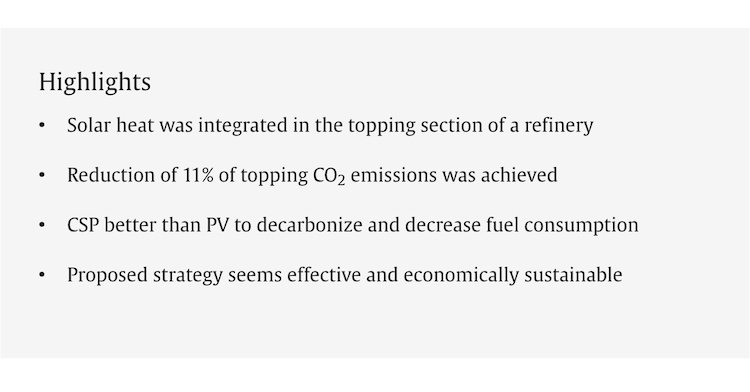Abstract:
A novel strategy for the decarbonization of crude oil distillation was proposed considering two distillation columns located in Sicily that were simulated by adapting the equipment datasheet of the refinery Raffineria di Milazzo (RAM). The proposed approach consists of the integration of the topping section with a concentrating solar power (CSP) plant to decrease the carbon dioxide emissions and the consumed fossil fuels in the furnaces of the distillation columns. Three hypothetical scenarios of applicative interest were considered. In that most economically sustainable, the use of solar heat allowed a decrease of CO2 emissions of 54.2 kt/year corresponding to a reduction of about 11% of the greenhouse gas emissions joined with the saving of 19.9 kt/year of methane with a rate of return of investment (ROROI) of 16.2%. As a comparison, if the land surface occupied by the CSP plant is used for photovoltaic production of green hydrogen considering an energy consumption of the electrolyzer of 4.70 kWh/Nm3, just 24.6 and 9.0 kt/year of CO2 and methane respectively can be saved and the ROROI decreases to 8.5%.
This study indicates that solar heat can be effectively and economically integrated in crude oil distillation to achieve a significant decarbonization of refineries.
Prestigiacomo, C., Giaconia, A., Proietto, F., Caputo, G., Balog, I., Ollà, E., Terranova, C. F., Scialdone, O., & Galia, A. (2024). Concentrated solar heat for the decarbonization of industrial chemical processes: A case study on crude oil distillation. Energy, 293, 130718. https://doi.org/10.1016/j.energy.2024.130718
The post Published at Energy – Concentrated solar heat for the decarbonization of industrial chemical processes: a case study on crude oil distillation appeared first on SolarPACES.


